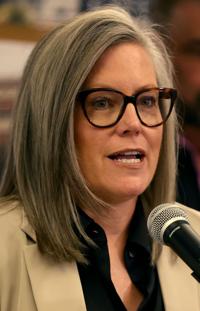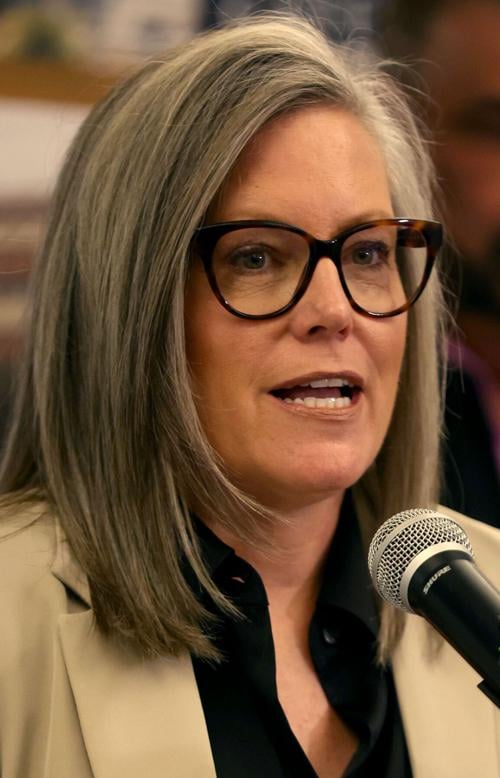PHOENIX — Democratic Gov. Katie Hobbs is spurning a judge’s suggestion she work out her differences with the GOP-controlled Senate over confirmation of her agency directors.
“It is not possible at this point,’’ Hobbs said Tuesday when asked if she will try to make a deal with Senate President Warren Petersen. A Maricopa County Superior Court judge, Scott Blaney, ruled last week that Hobbs broke the law by not submitting the names of agency chiefs to the Senate for confirmation.
Hobbs vowed Tuesday to appeal, a process that could take months.
In his ruling, the judge said it was clear the governor was trying to run state agencies with “executive deputy directors.’’ He said that ignored legal requirements to have a director, confirmed by the Senate, in charge of each agency.
Hobbs blamed it on Petersen and, more specifically, Sen. Jake Hoffman, R-Queen Creek, whom the Senate president tapped to head a special committee to review her nominees. Hoffman grilled some nominees and refused to consider others.
“This was the chaos created by Jake Hoffman’s sham committee that he’s using to inflict his radical political agenda on Arizonans,’’ Hobbs said Tuesday.
Her response had been the maneuver of withdrawing all of her pending nominations and instead naming each of her picks as executive deputy directors. Hobbs said that was the only way to ensure there was someone of her choosing in charge at each agency and that state government continued to function.
Hobbs, through her attorney, made the same argument to Blaney. But the judge was unimpressed.
“The governor’s frustration with a co-equal branch of government — even if that frustration was justified — did not exempt her director nominees from Senate oversight,’’ he wrote.
Whether Blaney agrees to let Hobbs continue for months with what he ruled is an illegal process while she appeals is unclear.
The judge has said he will set aside time in late July or early August to hear arguments about whether he should order Hobbs to comply.
“This will give these co-equal branches of government an opportunity to meet and confer in an attempt to reach a mutually agreeable resolution of this dispute,’’ Blaney wrote.
He warned that, absent an agreement, he could order Hobbs to comply with a law under which she has no discretion.
Hobbs, however, said she won’t consider making a deal with Petersen. “This is not what Arizonans want,’’ she said. “We’re going to ensure that government can continue despite the circus that they’ve created in the Senate.’’
Petersen said he thinks a deal could be reached. “We were always willing to work with them,’’ he said of the governor and her administration.
Hobbs said she is focused not just on the immediate fight but also on protecting gubernatorial powers.
“What they’ve done is unprecedented with director nominations,’’ she said.
It is true that Petersen, in forming the Director Nominations Committee, created a new system.
Until last year — when Democrat Hobbs took office — each governor’s picks would be reviewed by an existing committee with some expertise in the area.
That would have meant the choice by Hobbs of Jennifer Toth to head the Department of Transportation, for example, would have gone to the Senate Transportation and Technology Committee.
Instead, it went to Hoffman’s panel. And he asked her about things like what she thought about the roles of racism in road construction decisions and of toxic masculinity in accidents.
Toth, who had been director of the Maricopa County Transportation Department, responded it is her job to adopt the policies set out by the governor and the Legislature. She said her feelings aren’t relevant.
“This committee is here to evaluate you,’’ Hoffman shot back. “And I feel that it’s relevant, which is why I’m asking the questions.’’
Unable to get a vote before the Senate, Toth for the moment serves as ADOT’s executive deputy director under the procedure that Blaney found illegal.
Others who went before Hoffman’s panel were rejected outright.
One was Theresa Cullen, the governor’s choice to head the Arizona Department of Health Services.
During the committee hearing, Hoffman repeatedly berated her and the actions she had taken as Pima County health chief during the height of the COVID pandemic, like an overnight curfew and masking requirements. Cullen said she was simply advising county supervisors who made the final decisions.
Hoffman also took after her about the closing of schools, brushing aside her claims that those calls were made by district officials.
Hoffman’s committee voted 3-2 to reject Cullen, though by that time Hobbs, sensing the loss, withdrew her name from consideration. The agency is now run by Jennie Cunico as executive deputy director — at least until the litigation is resolved.
Get your morning recap of today's local news and read the full stories here: tucne.ws/morning





